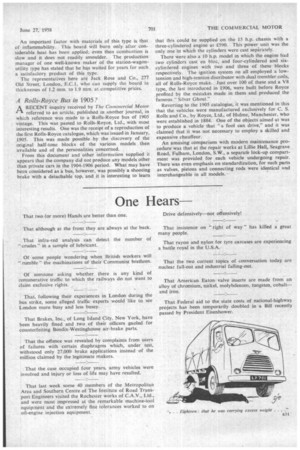One Hears—
Page 41

If you've noticed an error in this article please click here to report it so we can fix it.
That two (or more) Hands are better than one.
That although at the front they are always at the back.
That infra-red analysis can detect the number of " crudes " in a sample of lubricant.
Of some people wondering when British workers will " rumble " the machinations of their Communist brethren.
Of someone asking whether there is any kind of remunerative traffic to which the railways do not want to claim exclusive rights.
That, following their experiences in London during the bus strike, some alleged traffic experts would like to see London more busy and less busey.
That Brakes, Inc., of Long Island City, New York, have been heavily fined and two of their officers gaoled for counterfeiting Bendix-Westinghouse air-brake parts.
That the offence was revealed by complaints from users of failures with certain diaphragms which, under test, withstood only 27,000 brake applications instead of the million claimed by the legitimate makers.
That the case occupied four years, army vehicles were involved and injury or loss of life may have resulted.
That last week some 40 members of the Metropolitan Area and Southern Centre of The Institute of Road Transport Engineers visited the Rochester works of C.A.V., Ltd., and were most impressed at the remarkable machine-tool equipment and the extremely fine tolerances worked to on oil-engine injection equipment. Drive defensively—not offensively!
That insistence on "right of way" has killed a great many people. — That rayon and nylon for tyre carcases are experiencing a battle royal in the U.S.A.
That the two current topics of conversation today are nuclear fall-out and industrial falling-out.
That American Eaton, valve inserts are made from an alloy of chromium, nickel, molybdenum, tungsten, cobalt— and iron.
That Federal aid to the state costs of national-highway projects has been temporarily doubled in a Bill recently passed by President Eisenhower.








































































































































